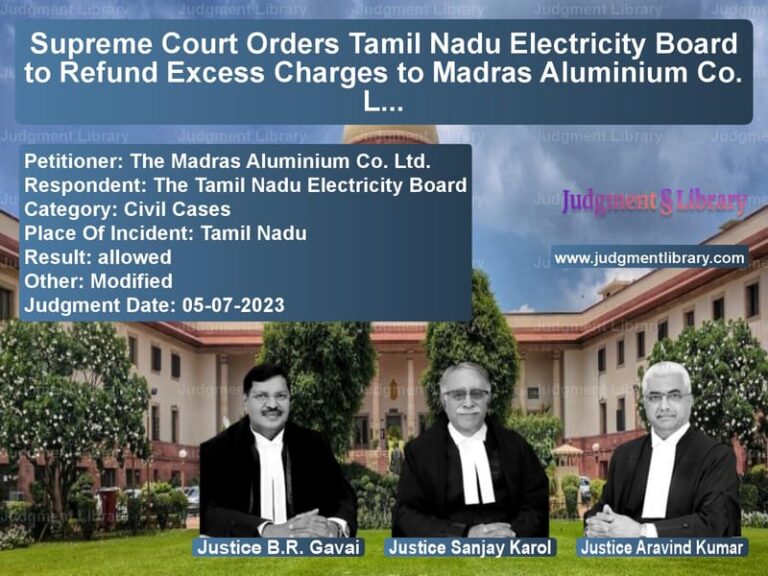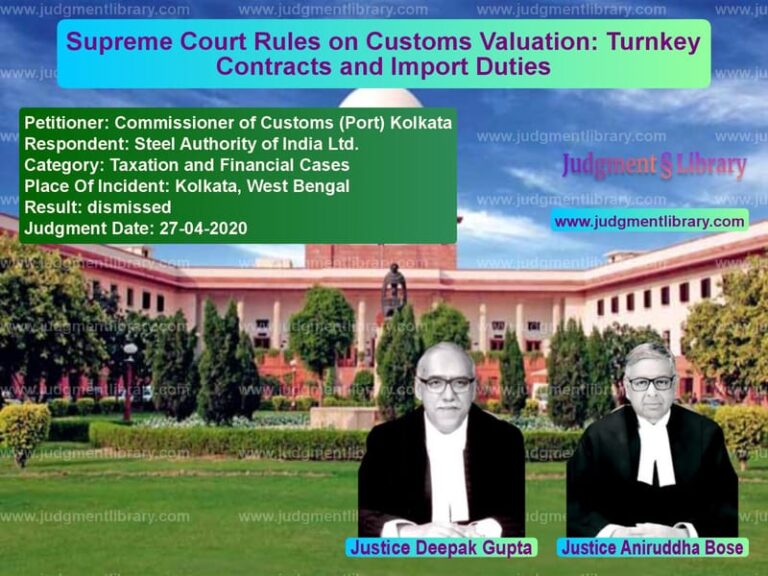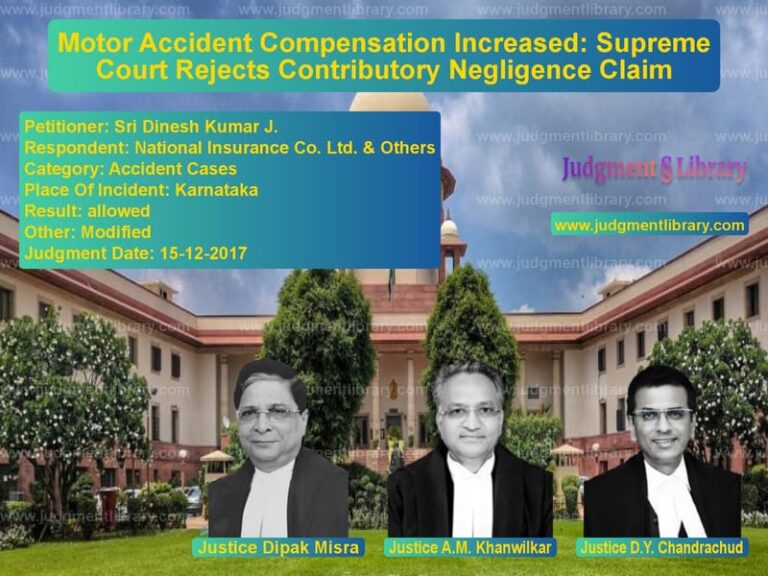Pegasus Spyware Case: Supreme Court Upholds Privacy and Orders Independent Probe
The Supreme Court of India, in the landmark case of Manohar Lal Sharma vs. Union of India & Ors., addressed one of the most debated digital privacy and surveillance issues in the country—the alleged use of Pegasus spyware by the government. The case questioned the state’s role in digital surveillance, its compliance with constitutional protections, and the necessity for accountability in cases of alleged illegal snooping.
The petitioners contended that the use of Pegasus spyware on Indian citizens violated their fundamental rights under Article 21 of the Constitution. They alleged that the spyware allowed unauthorized access to private data, calls, messages, and even device microphones and cameras, leading to severe violations of individual privacy and freedom of speech.
Background of the Case
The case originated after a global investigation revealed that Pegasus spyware, developed by the Israeli firm NSO Group, was allegedly used to target journalists, activists, politicians, and lawyers in India. The controversy raised significant concerns about whether the government had procured and deployed the spyware to conduct unauthorized surveillance on citizens.
Several petitioners, including noted journalists and activists, approached the Supreme Court, seeking an independent probe into the matter. The primary demands included:
- A declaration that the use of Pegasus spyware without consent violated fundamental rights.
- A judicial oversight mechanism to prevent unauthorized digital surveillance.
- A directive to the government to disclose whether it had purchased and used Pegasus spyware.
Arguments by the Petitioners
The petitioners, represented by prominent legal experts, raised the following concerns:
- Surveillance using Pegasus constituted a grave violation of the right to privacy as established in the K.S. Puttaswamy judgment.
- The government’s refusal to confirm or deny the use of Pegasus created ambiguity and warranted judicial intervention.
- The spyware could be used to suppress dissent, target journalists, and monitor political opponents, thereby endangering democracy.
- There was no legal framework governing the use of spyware, leading to unchecked executive action.
Arguments by the Respondents (Union of India)
The government, represented by the Solicitor General, presented counterarguments:
- National security concerns prevented the government from disclosing whether Pegasus had been procured and used.
- Any surveillance undertaken was in compliance with existing laws, including the Information Technology Act and the Telegraph Act.
- The government had mechanisms in place to regulate surveillance and ensure that it was carried out only when necessary.
- Raising concerns over national security in open court could set a dangerous precedent.
Key Observations by the Supreme Court
The Supreme Court made several crucial observations while delivering its judgment:
- The right to privacy is an integral part of Article 21, and any intrusion must be backed by due process of law.
- The state cannot escape judicial scrutiny by merely citing ‘national security’ as a defense.
- The lack of a clear stand from the government regarding the procurement and use of Pegasus raised concerns, warranting an independent probe.
- Journalists and activists play a crucial role in democracy, and their surveillance, if proven, could have serious implications on free speech and press freedom.
Formation of an Independent Committee
Given the gravity of the allegations and the government’s failure to provide a clear response, the Supreme Court appointed an independent committee to investigate the matter. The committee was tasked with:
- Determining whether Pegasus spyware was used on Indian citizens.
- Identifying victims of such surveillance.
- Assessing whether the government had procured and deployed Pegasus.
- Making recommendations on legal and policy measures to prevent unauthorized surveillance.
Legal Precedents Considered
The Supreme Court relied on several past judgments to arrive at its decision:
- K.S. Puttaswamy vs. Union of India (2017) – This case established privacy as a fundamental right under Article 21.
- People’s Union for Civil Liberties vs. Union of India (1997) – This ruling set guidelines for telephone tapping and surveillance.
- Anuradha Bhasin vs. Union of India (2020) – The Court held that restrictions on free speech and access to information must be justified under constitutional provisions.
Government’s Responsibility and Surveillance Laws
The judgment highlighted the need for a robust legal framework governing digital surveillance. Currently, surveillance in India is primarily regulated by:
- The Indian Telegraph Act, 1885 – This law governs telephone interception but lacks specific provisions for spyware-based surveillance.
- The Information Technology Act, 2000 – While this act provides guidelines for electronic surveillance, it does not explicitly cover government use of spyware.
- The Right to Privacy Judgment (2017) – The Supreme Court had emphasized that any intrusion into privacy must be legal, necessary, and proportionate.
The Court noted that an absence of a dedicated legal framework for the use of spyware posed a risk to democratic values and individual freedoms.
Conclusion
The Supreme Court’s ruling in Manohar Lal Sharma vs. Union of India is a landmark decision that upholds privacy rights and demands greater transparency in digital surveillance. By ordering an independent committee to investigate the Pegasus allegations, the Court reaffirmed its commitment to protecting fundamental rights while balancing national security concerns.
This case sets a crucial precedent for future surveillance-related litigations, ensuring that the government cannot evade accountability by invoking national security without justification. The ruling strengthens democratic principles and reinforces the need for a clear legal framework governing state surveillance in India.
Petitioner Name: Manohar Lal Sharma.Respondent Name: Union of India and Ors..Judgment By: Justice N.V. Ramana, Justice Surya Kant, Justice Hima Kohli.Place Of Incident: India.Judgment Date: 27-10-2021.
Don’t miss out on the full details! Download the complete judgment in PDF format below and gain valuable insights instantly!
Download Judgment: manohar-lal-sharma-vs-union-of-india-and-o-supreme-court-of-india-judgment-dated-27-10-2021.pdf
Directly Download Judgment: Directly download this Judgment
See all petitions in Fundamental Rights
See all petitions in Public Interest Litigation
See all petitions in Cyber Crimes
See all petitions in Separation of Powers
See all petitions in Constitution Interpretation
See all petitions in Judgment by N.V. Ramana
See all petitions in Judgment by Surya Kant
See all petitions in Judgment by Hima Kohli
See all petitions in allowed
See all petitions in supreme court of India judgments October 2021
See all petitions in 2021 judgments
See all posts in Constitutional Cases Category
See all allowed petitions in Constitutional Cases Category
See all Dismissed petitions in Constitutional Cases Category
See all partially allowed petitions in Constitutional Cases Category







